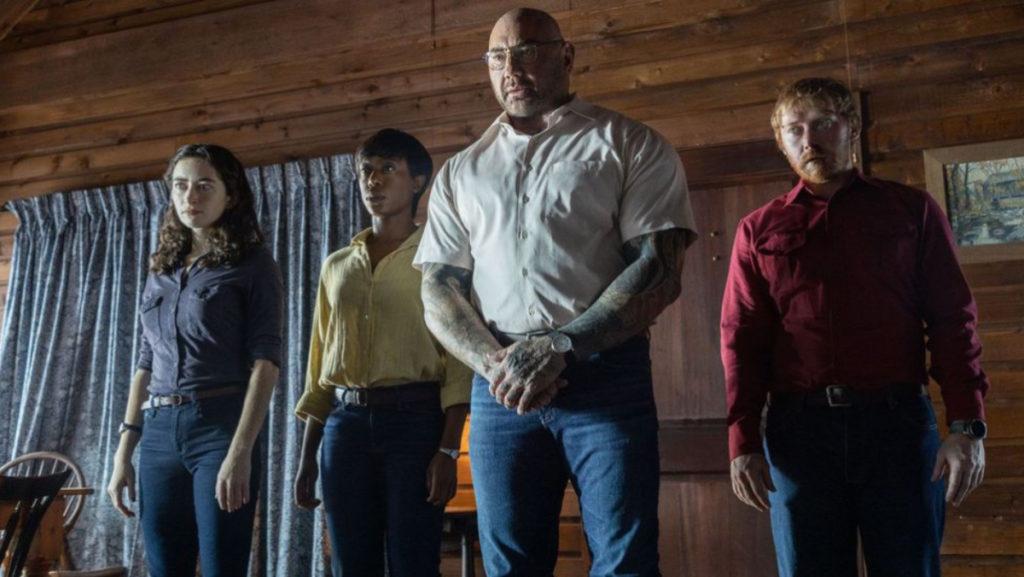If you were forced to make a choice for a loved one to die so that the rest of your loved ones could live, would you be able to choose? Would you be willing to sacrifice your own life so no one else has to die?
This is a moral query that may sound familiar to some. In “Knock at the Cabin,” it is a very real question that Eric (Jonathan Groff), Andrew (Ben Aldridge) and their adopted daughter Wen (Kristen Cui) are presented with that, if gone unanswered, could mean the end of the known world and everyone in it.
Director and co-writer M. Night Shyamalan adapted Paul Tremblay’s 2018 horror novel, “The Cabin at the End of the World,” to nail-biting effect in what is refreshingly some of his best work in years. The “Sixth Sense” (1999) and “Glass” (2019) director, known for his twists that either shock or disappoint, takes a straightforward approach with Tremblay’s material. This choice not only feels like a breath of fresh air, but allows the director to let his work speak for itself rather than some shoe-horned twist, as is typically the case.
“Knock at the Cabin” opens with a subtly tense bang as second-grade teacher Leonard (Dave Bautista) has a friendly conversation with Wen, bonding over their shared interest in trapping grasshoppers. They do this in front of a quaint cabin in the woods being rented by Eric and Andrew for a family getaway. Once their interaction takes a concerning turn after three other strangers arrive at the cabin, Wen runs to warn her dads of the impending group that intends to get to the family by any means necessary.
Unnecessary flashbacks inform the viewer that Eric and Andrew have been the subjects of prejudice and homophobia throughout their relationship. Aside from the relevant social commentary, this context provides some justification for why they are as protective of each other and Wen as they immediately are.
Following a bare-knuckled sequence in which the group forcefully breaks into the cabin and subdues the family, Leonard lays out the reason why the group is at the cabin. They have been given a job to prevent the apocalypse, and the only way they succeed with their own lives intact is if the family chooses to end one of their own lives.
The choice that they are forced to grapple with is largely the most fascinating element in the film, yet the family spends little to no time actually discussing it, instead vehemently refusing to comply each time they are asked. This is arguably one of its biggest faults, as if this were a real-life situation, people would likely discuss the choice hypothetically even if they refuse to truly entertain the idea of making a decision. The choice on the part of the family to play it safe and stick “together, always” no matter what makes the story less interesting than it could have been.
Luckily, “Knock at the Cabin”’s tight pace and mostly stellar performances keep the viewer engaged, especially in its slower and more far-fetched moments.
Batista, who only seems to grow as a performer with each film he stars in, is a powerhouse in “Knock at the Cabin.” The way he portrays his character’s kindhearted and almost sweet nature directly contradicts his physical stature, often unsettlingly. Through the way he uncomfortably emotes, Batista is able to convey the fact that Leonard is constantly terrified. He, like the other three members that make up his group, does not even want to be at the cabin. However, he is constantly tortured by visions of death and destruction that push him forward. The way the viewer sees Leonard’s struggle simply through the look in Batista’s eyes is quite impressive.
“Knock at the Cabin” is a suspenseful thriller that is, at times, emotionally demanding to an effective degree. Although it could have featured slightly more interesting philosophical conversations from its main three players about the choice given to them and some plot elements do feel awkwardly contrived, it emerges as a success. By its end, the viewer cares about the family and even the four-horsemen-of-the-apocalypse-like quartet that rudely upends their vacation plans. Hopefully, it also serves as a reminder for Shyamalan that not all of his movies have to have a twist to be highly regarded.




















